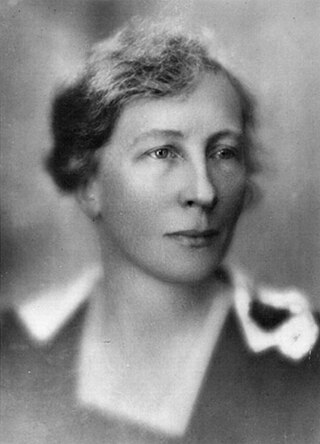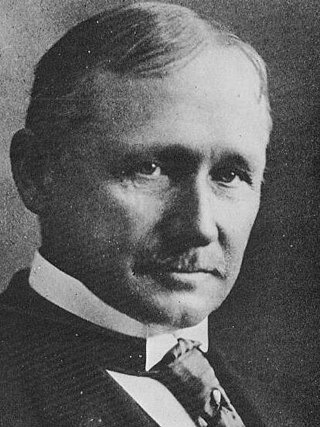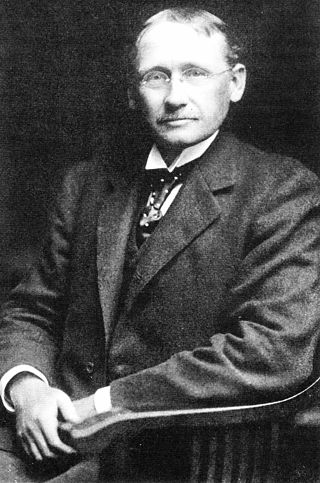Management is the administration of organizations, whether they are a business, a nonprofit organization, or a government body through business administration, nonprofit management, or the political science sub-field of public administration respectively. It is the science of managing the resources of businesses, governments, and other organizations.

Lillian Evelyn Gilbreth was an American psychologist, industrial engineer, consultant, and educator who was an early pioneer in applying psychology to time-and-motion studies. She was described in the 1940s as "a genius in the art of living." Gilbreth, one of the first female engineers to earn a Ph.D., is considered to be the first industrial/organizational psychologist. She and her husband, Frank Bunker Gilbreth, were efficiency experts who contributed to the study of industrial engineering, especially in the areas of motion study and human factors. Cheaper by the Dozen (1948) and Belles on Their Toes (1950), written by two of their children tell the story of their family life and describe how time-and-motion studies were applied to the organization and daily activities of their large family. Both books were later made into feature films.
Operations research, often shortened to the initialism OR, is a discipline that deals with the development and application of analytical methods to improve decision-making. The term management science is occasionally used as a synonym.
A Master of Business Administration is a postgraduate degree focused on business administration. The core courses in an MBA program cover various areas of business administration such as accounting, applied statistics, human resources, business communication, business ethics, business law, strategic management, business strategy, finance, managerial economics, management, entrepreneurship, marketing, supply-chain management, and operations management in a manner most relevant to management analysis and strategy. It originated in the United States in the early 20th century when the country industrialized and companies sought scientific management.
Business administration, also known as business management, is the administration of a commercial enterprise. It includes all aspects of overseeing and supervising the business operations of an organization. From the point of view of management and leadership, it also covers fields that include office building administration, accounting, finance, designing, development, quality assurance, data analysis, sales, project management, information-technology management, research and development, marketing and communication studies.

Frederick Winslow Taylor was an American mechanical engineer. He was widely known for his methods to improve industrial efficiency. He was one of the first management consultants. In 1909, Taylor summed up his efficiency techniques in his book The Principles of Scientific Management which, in 2001, Fellows of the Academy of Management voted the most influential management book of the twentieth century. His pioneering work in applying engineering principles to the work done on the factory floor was instrumental in the creation and development of the branch of engineering that is now known as industrial engineering. Taylor made his name, and was most proud of his work, in scientific management; however, he made his fortune patenting steel-process improvements. As a result, scientific management is sometimes referred to as Taylorism.

An academic discipline or field of study is a branch of knowledge, taught and researched as part of higher education. A scholar's discipline is commonly defined by the university faculties and learned societies to which they belong and the academic journals in which they publish research.
Industrial relations or employment relations is the multidisciplinary academic field that studies the employment relationship; that is, the complex interrelations between employers and employees, labor/trade unions, employer organizations, and the state.

Collaboration is the process of two or more people, entities or organizations working together to complete a task or achieve a goal. Collaboration is similar to cooperation. Most collaboration requires leadership, although the form of leadership can be social within a decentralized and egalitarian group. Teams that work collaboratively often access greater resources, recognition and rewards when facing competition for finite resources.

Scientific management is a theory of management that analyzes and synthesizes workflows. Its main objective is improving economic efficiency, especially labor productivity. It was one of the earliest attempts to apply science to the engineering of processes to management. Scientific management is sometimes known as Taylorism after its pioneer, Frederick Winslow Taylor.

Public Administration or Public Policy and Administration is the implementation of public policy, administration of government establishment, management of non-profit establishment, and also a subfield of political science taught in public policy schools that studies this implementation and prepares people, especially civil servants in administrative positions for working in the public sector, voluntary sector, some industries in the private sector dealing with government relations, regulatory affairs, legislative assistance, corporate social responsibility (CSR), environmental, social, governance (ESG), public procurement (PP), public-private partnerships (P3), and business-to-government marketing/sales (B2G) as well as those working at think tanks, non-profit organizations, consulting firms, trade associations, or in other positions that uses similar skills found in public administration.
Human resource management is the strategic and coherent approach to the effective and efficient management of people in a company or organization such that they help their business gain a competitive advantage. It is designed to maximize employee performance in service of an employer's strategic objectives. Human resource management is primarily concerned with the management of people within organizations, focusing on policies and systems. HR departments are responsible for overseeing employee-benefits design, employee recruitment, training and development, performance appraisal, and reward management, such as managing pay and employee benefits systems. HR also concerns itself with organizational change and industrial relations, or the balancing of organizational practices with requirements arising from collective bargaining and governmental laws.
Wilfrid Laurier University Press, based in Waterloo, Ontario, is a publisher of scholarly writing and is part of Wilfrid Laurier University. The fourth-largest university press in Canada, WLUP publishes work in a variety of disciplines in the humanities and social sciences — literary criticism, indigenous studies, sociology, environmental studies, and history among them — as well as books of regional interest. Laurier Press also provides publishing services to scholarly associations and journals.
Michael Christopher Jackson OBE is a British systems scientist, consultant and Emeritus Professor of Management Systems and former Dean of Hull University Business School, known for his work in the field of systems thinking and management.
Change management is a collective term for all approaches to prepare, support, and help individuals, teams, and organizations in making organizational change. It includes methods that redirect or redefine the use of resources, business process, budget allocations, or other modes of operation that significantly change a company or organization.
Amsterdam University Press (AUP) is a university press that was founded in 1992 by the University of Amsterdam in the Netherlands. It is based on the Anglo-Saxon university press model and operates on a not-for-profit basis. AUP publishes scholarly and trade titles in both Dutch and English, predominantly in the humanities and social sciences and has a publishing list of over 1400 titles. It also publishes multiple scholarly journals according to the open access publishing model. From 2000 until 2013, the AUP published the journal Academische Boekengids with book reviews written by editors from multiple Dutch universities.

Budapest Business School (BBS) is a private business school, formerly a public university, specialising in business studies and social sciences in Budapest, Hungary. It was founded in 1857 by the merchants and bankers of Austria-Hungary. It is the oldest public business school in the world, and the second oldest among all business schools, after the ESCP.
The University of Washington Press is an American academic publishing house. The organization is a division of the University of Washington, based in Seattle. Although the division functions autonomously, they have worked to assist the university's efforts in support of the Burke Museum of Natural History and Culture, the Henry M. Jackson School of International Studies, and the Center for Innovation and Research in Graduate Education. Since 1915, they have published the works of first-time writers, including students, poets, and artists, along with authors known throughout the world for their work in the humanities, arts, and sciences.
N. Srinivasa Iyer Ramaswamy (1926–2012), popularly known as Cartman Ramaswamy, was an Indian engineer, educationist, management academic and writer, and the founder director of the Indian Institute of Management, Bangalore. He was the founder of Centre for Action, Research and Technology for Man, Animal and Nature (CARTMAN), a non governmental organization working for region-relevant and appropriate technology transfer to rural areas and Indian Heritage Academy, an organization involved in propagating Indian cultural traditions. He was also the founder chairman of the Adarsh Vidya Kendra (AVK) Group of educational institutions. The Government of India awarded him the third highest civilian honour of the Padma Bhushan, in 2006, for his contributions to society.
Charles D. Wrege was an American management historian, and Professor at Rutgers University. He is known for his contributions to management history, especially his critical work on Frederick W. Taylor and scientific management.







